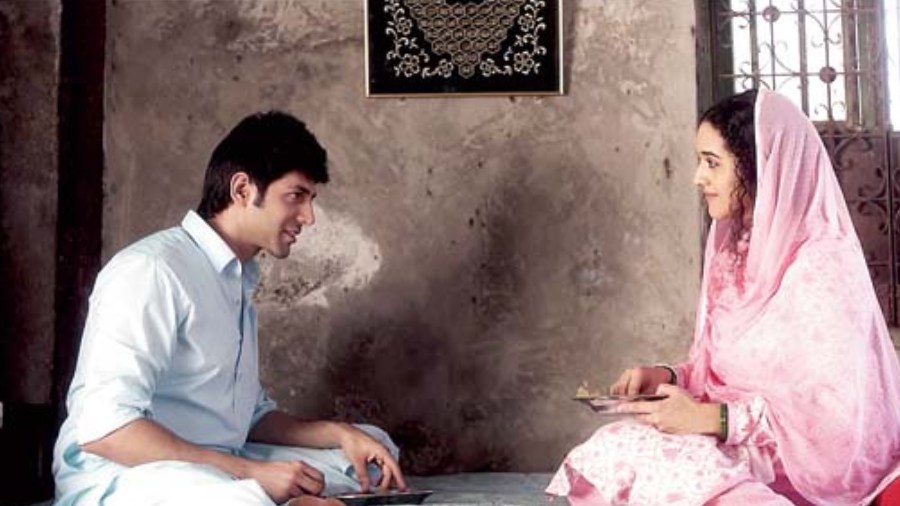Film-maker Tanuja Chandra speaks to The Telegraph on her poignant 45-minute film Silvat,a saga of forbidden of love and pain, starring Kartik Aryan when he was a newcomer, ahead of the Indian television premiere on Sunday.
What is the meaning of Silvat?
It’s an Urdu word. It means creases, like in a bed sheet or a dupatta. In the film, it means disturbances. Without some disturbance, life is very smooth, na? The story is about this young tailor living in Bhindi Bazaar, south Mumbai, who falls in love with a young woman from the same mohalla. In the late Nineties, a lot of men from cities would go to the Middle East for work and would stay there for years. This woman the tailor falls in love with, right after her marriage, her husband had left for the Middle East to work and has not come back for five years. So she’s a lonely woman living alone. He is a very charming fellow. Women depend on their tailors to make their dresses. So there is an unspoken intimacy between them. He brings the silvat into what she thought was an ironed-out life.
It was a part of Zee Entertainment’s 2016 Indo-Pak collaboration, Zeal for Unity, right?
Yes, the project was planned as a collaboration of Indian and Pakistani directors. There were six directors from either side of the border and each was given the freedom to make a film on a subject of his or her choice. We were not working with each other but the project brought us together. Such a brief allows the storyteller to explore stories that they haven’t been able to tell or make movies on. Of course, the short film format — Silvat is 45 minutes, so it’s a long short film — also gives you a luxury which won’t be there in a mainstream feature film where there’ll be many stakeholders to tell you what to do, who to cast.…
You had a very young Kartik Aryan playing the lead.
He had just begun working in Hindi movies, with possibly only one release till then. He used to message me and I used to tell him that if something comes along we would work together. Then my writer Faraz Ansari came up with this beautiful story — a deep romantic story with mainly two characters. This was a heavy role for him because it’s a very hidden, quiet romance, not those big plots where somebody is jumping off a balcony for love. It needed a deep performance. I always love working with new and raw actors because they’re very open and listen very carefully. Kartik has a natural on-screen charm. Along with that, I tried to bring a quietness in his attitude. So there is this fun-loving, happy guy but in his heart, there is a quietness. Of course, it’s love in a sense but she’s married.

Tanuja Chandra
So there’s a lot of holding back also.
Yes, a lot of holding back but expressing through the body. In your heart you are feeling it, but not showing it. I always ask my actors to feel. It’s not a question of dialogues, which anybody can say. If you feel it, the body will express it. It’s a very Bombaiya story. They speak a mixture of Urdu and south Bombay lingo of Hindi. The Bhindi Bazar area is a crowded place, with lots of people and noise, small homes. The female lead was a first-time actress, Meher Mistry, who had worked in theatre. Both actors had an untouched sweetness, which is not sophisticated but still has an elegance.
Does it help the film that Kartik is a star now?
Of course now he is a big star (laughs). Even when Silvat was on Zee 5, I used to get messages from people that Kartik is so different in it. I’m glad that more people will be able to see it as it is coming on DTH now. Kartik is now being seen on screen quite a lot but he has not done another such serious romantic story.
What news of your current project Hush Hush (starring Juhi Chawla, Soha Ali Khan, Ayesha Jhulka)?
Covid delayed everything in the world. There was no delay on our part. The shoot is over. I’m not supposed to talk about it till we are done with post-production.
You posted a throwback picture on Instagram of Zameen Aasmaan (directed by Mahesh Bhatt, with Tanuja as assistant director).
That was over 25 years ago when satellite television was starting out and DD Metro was the first one. Tanvi (Azmi, who was part of the cast) sent it to me. These older shows, be it on Zee TV or Doordarshan, are becoming available to watch again. Zameen Aasmaan is on YouTube. We had very literary writers, interesting acting, casting.... It had almost 100 episodes but as it was a weekly, we got decent time to shoot.
You called it the “early, more innocent days of Indian television”.
Yes. Now people don’t do weeklies anymore. When the dailies started, it became like a machine. With the web, again there is a change. Of course, my first experience of the web was also challenging. Doing seven-eight episodes (of Hush Hush) was like doing three films at a time. But still, it’s not a daily show. Of course, I have never experienced luxurious shooting. I don’t think that exists unless you are making a Rs 100-200 crore feature film. There is an economics to all productions. It requires you to work efficiently and fast.
To get control on the web series game, one has to learn the method and give writers ample time to write. One should never rush the writers. That’s the most important part of the process. On the web, you could do short stories like Silvat, or an omnibus of short stories. You could do 10-minute stories, half an hour stories, documentaries… It has changed the game.
Tanuja Chandra’s film Silvat will beam on the channel Zindagi which launches on DTH platforms Tata Play and Dish TV/D2H on June 12 at 8pm as a value-added service
